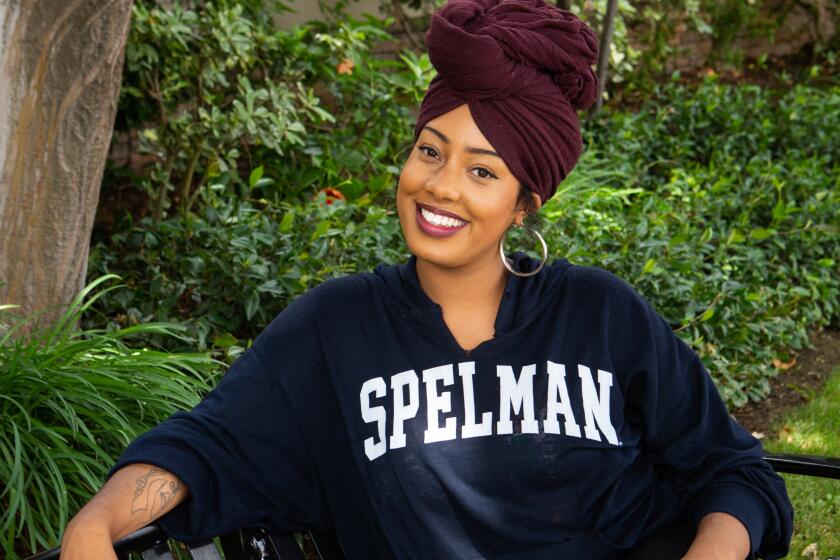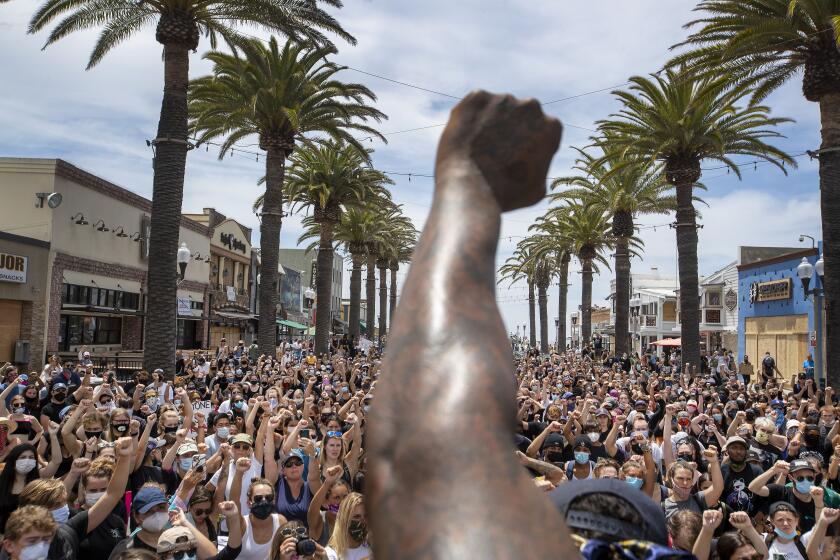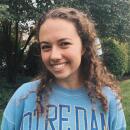Pandemic portraits: Celebrity photographer Brian Bowen Smith documents epic American road trip
Brian Bowen Smith knew what the cover of his book would be the moment he shot the photo.
“He’s a famous cowboy [in Colorado] and he’s got a big ranch there. We called him up and … we came on by and there he was,” Bowen Smith told The Times in a phone interview about his book in progress, “Drivebys.” “I got in the car and he just started running, and I look over. And he’s just sitting there and he looks at me, he takes off his hat and goes, ‘Yeehaw!’”
It’s the most dramatic shot in a series that Bowen Smith, an L.A.-based photographer known for his celebrity portraits, took on a meandering road trip through pandemic-stricken America, armed only with a Leica, an Instagram account, a 1958 Ford F100 pickup and a single aesthetic constraint: Every picture had to be taken through his truck window. With the help of a Kickstarter campaign, Bowen Smith plans to compile them into a book, “Drivebys,” and perhaps a documentary.
It feels like the perfect approach (and Bowen Smith isn’t even the only one taking it). We’re all supposed to be staying in our homes and vehicles and keeping a car’s-length distance from others. Bowen Smith saw it as a unique project, a way to do something safely productive — and a handy excuse to leave his house.
As a child, Asha Grant didn’t know where to find books about people who looked like her. Next year she’ll open that place, the Salt Eaters, in Inglewood.
The idea to capture a country in varying states of isolation through a socially distanced frame was inspired by a shoot Bowen Smith did with a family friend, Téa Romano.
“She’s really beautiful and interesting,” said Bowen Smith, who photographed Romano in her driveway. “I need[ed] to start my Ford anyway,” so he took a shot from inside. “After we did the first one I was like, ‘Wow, this is actually really cool. I gotta do more of these.’ That’s what became the series.”
Bowen Smith’s initial plans were modest — a drive to New York and back, no longer than two weeks. Six weeks and 11,000 miles later, he has photographed more than 120 people.
If the project hearkens back to the writers and photographers of the Works Progress Administration, documenting an earlier American crisis of mass unemployment, the Great Depression, it’s not for Bowen Smith to make those connections explicit. “I kind of wanted to just go by the seat of my pants,” he said, “see what happens and then put it in a book and let it come together and people can form their own opinions. So I didn’t really have an agenda.”
Nor did he have much of an itinerary — just a vague idea that he’d be shooting friends and others he connected with via social media along the way. Bowen Smith hopped into “Pearl,” as he calls his shiny, white, antique Ford, on May 2, just after his 51st birthday. He returned home June 12. He let friends and followers across the country — celebrities and colorful civilians alike — dictate his travels.
On the anniversary of the birth of the Works Progress Administration, it’s worth asking what a post-COVID Federal Writers Project might look like.
Bowen Smith used a Leica M 10 Monochrom, a compact black-and-white camera that was both practical and “very film-like,” he said, “which I really love about all the images. It kind of made them feel like you don’t know if it was 1960 or 2020.”
Bowen Smith found his path to photography in a different way than most — as a model. Herb Ritts helped with that.
“He shot me for a Gap campaign actually,” Bowen Smith said. “And then we became friends. I really was interested in photography, and he convinced me to kind of dig more into it.” Only now, he added, “after 30 years of doing it, I can finally say that, yes, now I am a photographer.”
Proceeds from the book will go to Feeding America, a charity to which Bowen Smith has a personal connection. Growing up in New York, he relied on the program’s school lunches. “Sometimes without them,” he said, “I didn’t eat.”
Bowen Smith walked us through the creation of five of his most memorable shots.
Elvis
“This guy DM’ed me and said ‘Hey do you need an Elvis?’ And I said, ‘Yeah, I actually do.’ And so he said, ‘All right, well I’m out of work.’ He usually gets his hair dyed jet black, and he’s got the outfit already. So I said ‘I’ll pay for your hair to get done. You just meet me.’ When I got to Vegas I drove around, and I saw that little convenience store closed down. I said ‘Meet me here, I think it’d be cool.’ There was an Elvis on the wall.”
Common
Around the start of his journey, Bowen Smith hit up the rapper Common. “He was nice enough to say, ‘Just go up to my house, and we’ll do a shot.’ He lives at a dead end in Beverly Hills.” As they were setting up in front of the END sign, Common pointed out that Bowen Smith was only at the beginning of his journey. “And so I’m like, ‘Let me do something real quick.’” Bowen Smith had a can of black spray paint in his truck; he’d been painting the back of his son’s surfboard in a striped pattern to ward off sharks. “I spray painted that sign. And then he stood in front of the car, like, ‘Yep, that’s it.’”
Amy Yeung
“[Amy’s] been raising money for the [Navajo] tribe. She said, ‘We’re not getting help from anyone, like the government, no one.’ So she quit her business and just went full time into trying to help the tribe [with] COVID — trying to get them masks, trying to get treatment for the people that did have it, educating them on how to social distance.” Talking to Bowen Smith about it, Yeung was overwhelmed. “She was just bawling, and I’ve got this great picture of her getting it together and looking so strong in the face of what she’s been dealing with. And it was just beautiful.”
Todd Blubaugh & Nicola Collie
“Todd and Nicola are friends of mine. They live out in Twentynine Palms.” Bowen Smith wanted to shoot them on a motorcycle. “He’s a big motorcycle enthusiast, and we ride together. I was trying to get my headlights on the motorcycle, and they were just standing to the side. And I looked over and saw them in the mirror, and she gave him a kiss. And, ‘Oh my gosh.’ So I took his phone — because it was getting really dark out — and had them come close.” Smith held a flashlight up to their faces and had them recreate the kiss, shooting through his side mirror. “Wow. Accidents happen.”Black Lives Matter protesters
Bowen Smith knew he had to get home to cover the protests. A road trip that started in the thick of quarantine ended with a movement that drove people out into the streets. “I thought ‘I’ve got to get back and at least try to get there in time for some march or somehow capture a picture that shows this, because it’s really a big sign of what was going on and a nice cap to the trip.”
Walter Mosley, Luis Rodriguez, the coiner of #BlackLivesMatter and others sketch a hopeful future for L.A. and the U.S. after George Floyd protests.
More to Read
The biggest entertainment stories
Get our big stories about Hollywood, film, television, music, arts, culture and more right in your inbox as soon as they publish.
You may occasionally receive promotional content from the Los Angeles Times.













